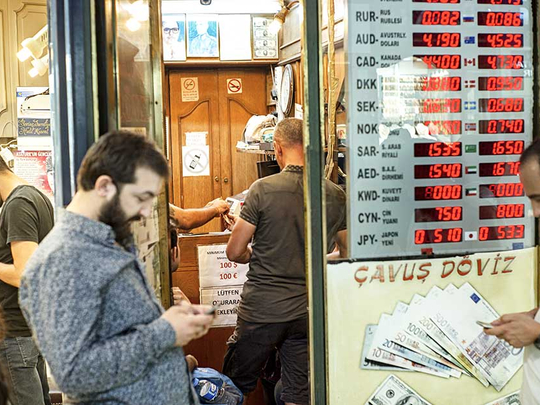
(Bloomberg) — There is little sign that the euro is about to turn around its rough patch against the dollar as concerns over the exposure of the region’s banks to Turkey ratchet up and bund yields slide back toward the lower end of their recent range.
The common currency broke below support at $1.1500 Friday to touch its lowest point since July last year following a report that the European Central Bank sees UniCredit SpA as particularly vulnerable to Turkey’s market woes. While there isn’t a large build-up of long positions to be squeezed out, a change in fortunes may be unlikely until bund yields begin to rise more meaningfully, according to Societe Generale SA.
“ECB concerns grow over EU banks’ Turkey exposure has provided the catalyst for EUR/USD to fall out of the bottom of its three-month 1.1500-1.1850 range,” strategist Kit Juckes wrote in a note to clients. “We would still rather own NOK and SEK than EUR, or GBP.”
The euro has the potential to drop further if there is more evidence of spillover from the rout in the lira to the euro-area banking sector. Credit Agricole SA strategist Valentin Marinov sees a break of $1.14 potentially “opening the way” to a test of $1.1360-$1.1370.
Traders face euro-area second-quarter gross domestic product data on Aug. 14, as well as industrial production data for June, while Germany’s ZEW survey is published the same day. The final July CPI reading for the region is scheduled Aug. 17. A host of economic numbers — including US retail sales, leading indicators, consumer sentiment — are due this week, which could also dominate proceedings for euro-dollar.
The euro slid 0.9 per cent to $1.1429 as of 4:02pm in London, on course for its third consecutive weekly decline. Three-month risk reversals on the pair show traders are the most bearish since April 2017. German 10-year yields fell as much as five basis points to 0.32 per cent, the lowest level since July 20.
The situation in Turkey has the potential to weigh further on the euro “if the market starts to suspect that there is a significant exposure to Turkey among euro-zone firms,” said Rabobank International strategist Jane Foley. Investors will be keeping a keen eye out for further media reports such as the one published in the Financial Times, or evidence in banks’ quarterly earnings, she said.












